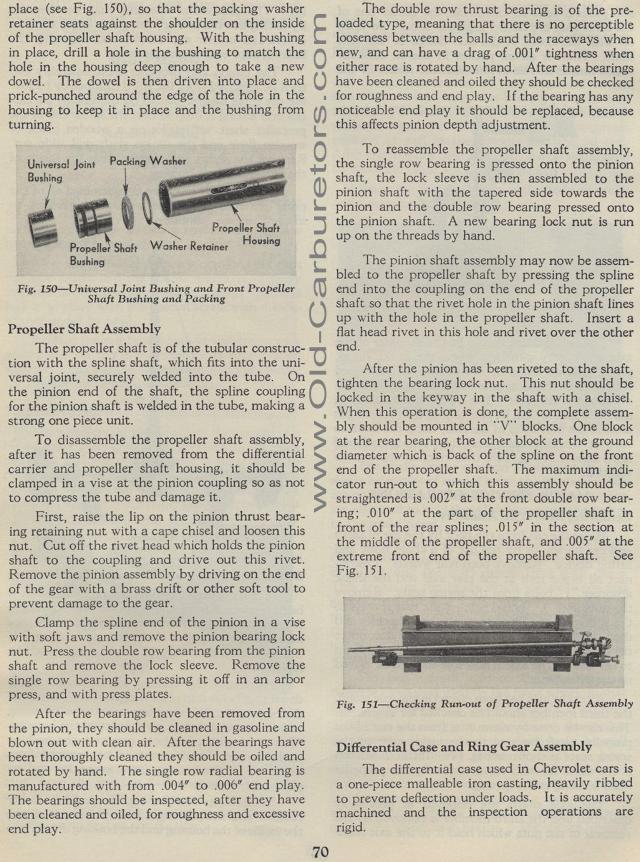Skip to: site menu | section menu | main content
place (see Fig. 150), so that the packing washer retainer seats against the shoulder on the inside of the propeller shaft housing. With the bushing in place, drill a hole in the bushing to match the hole in the housing deep enough to take a new dowel. The dowel is then driven into place and prick-punched around the edge of the hole in the housing to keep it in place and the bushing from turning.
Universal Joint Bushing and Front Propeller Shaft Bushing and Packing Propeller Shaft Assembly
The propeller shaft is of the tubular construction with the spline shaft, which fits into the universal joint, securely welded into the tube. On the pinion end of the shaft, the spline coupling for the pinion shaft is welded in the tube, making a strong one piece unit.
To disassemble the propeller shaft assembly, after it has been
removed from the differential carrier and propeller shaft housing,
it should be clamped in a vise at the pinion coupling so as not
to compress the tube and damage it.
First, raise the lip on the pinion thrust bearing retaining nut
with a cape chisel and loosen this nut. Cut off the rivet head
which holds the pinion shaft to the coupling and drive out this
rivet. Remove the pinion assembly by driving on the end of the
gear with a brass drift or other soft tool to prevent damage to
the gear.
Clamp the spline end of the pinion in a vise with soft jaws and
remove the pinion bearing lock nut. Press the double row bearing
from the pinion shaft and remove the lock sleeve. Remove the single
row bearing by pressing it off in an arbor press, and with press
plates.
After the bearings have been removed from the pinion, they should
be cleaned in gasoline and blown out with clean air. After the
bearings have been thoroughly cleaned they should be oiled and
rotated by hand. The single row radial bearing is manufactured
with from .004" to .006" end play. The bearings should
be inspected, after they have been cleaned and oiled, for roughness
and excessive end play.
The double row thrust bearing is of the pre-loaded type, meaning
that there is no perceptible looseness between the balls and the
raceways when new, and can have a drag of .001" tightness
when either race is rotated by hand. After the bearings have been
cleaned and oiled they should be checked for roughness and end
play. I f the bearing has any noticeable end play it should be
replaced, because this affects pinion depth adjustment.
To reassemble the propeller shaft assembly, the single row bearing
is pressed onto the pinion shaft, the lock sleeve is then assembled
to the pinion shaft with the tapered side towards the pinion and
the double row bearing pressed onto the pinion shaft. A new bearing
lock nut is run up on the threads by hand.
The pinion shaft assembly may now be assembled to the propeller
shaft by pressing the spline end into the coupling on the end of
the propeller shaft so that the rivet hole in the pinion shaft
lines up with the hole in the propeller shaft. Insert a flat head
rivet in this hole and rivet over the other end.
After the pinion has been riveted to the shaft, tighten the bearing
lock nut. This nut should be locked in the keyway in the shaft
with a chisel. When this operation is done, the complete assembly
should be mounted in "V" blocks. One block at the rear
bearing, the other block at the ground diameter which is back of
the spline on the front end of the propeller shaft. The maximum
indicator run-out to which this assembly should be straightened
is .002" at the front double row bearing; .010" at the
part of the propeller shaft in front of the rear splines; .015" in
the section at the middle of the propeller shaft, and .005" at
the extreme front end of the propeller shaft. See Fig. 151.
Fig. 151— Checking Run-out of Propeller Shaft Assembly Differential
Case and Ring Gear Assembly
The differential case used in Chevrolet cars is a one-piece malleable
iron casting, heavily ribbed to prevent deflection under loads.
It is accurately machined and the inspection operations are rigid.
Universal Joint Packing Washer Bushing
Propeller Shaft Washer Retainer Housing
